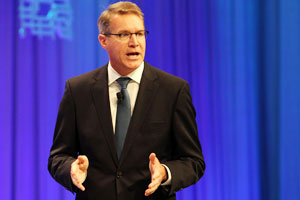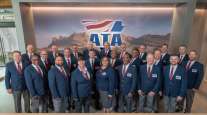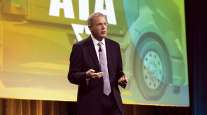Senior Reporter
Spear: Industry Is Strong, But Unity Is Imperative

“Trucking is already one of the most regulated and taxed industries in America,” said Spear, speaking Oct. 3 at the opening session of ATA’s Management Conference & Exhibition. “In the eyes of some elected officials we look like a money-filled pinata. I’m here to tell you that those days, these impressions are over.”
Spear said that trucking’s future is closely linked to what happens in Washington, D.C., noting that federal regulators and states are being allowed to “go unchecked and issue mandates as if they were parking tickets.”
He added that “sound public policies such as funding of the nation’s infrastructure are being suffocated by a bunch of cubical-dwelling idealogues who think it’s cool to shut down our government.”
Spear said that ATA’s first lobbying efforts are focused on ensuring a permanent hours-of-service fix of the restart provision and pre-empting states such as California from “adding new layers of meal and rest break requirements on carriers operating across state lines.”
“Both of these issues have enjoyed broad support and careful, coordinated grass-roots and grass-tops advocacy on Capitol Hill,” Spear said. “And I’m confident that everyone’s hard work will pay off.”
He pledged that ATA will get a “seat at the table” to help shape the path of autonomous vehicle technology that has so far largely been driven by the automobile industry.
“Autonomous vehicle technology is real, folks, and it’s here, whether we like it or not,” Spear said. “If properly developed, it has the potential to dramatically improve safety and reduce congestion.”
He said ATA also will be actively engaged in a number of issues, including: pushing for sustainable infrastructure funding, Phase 2 greenhouse-gas emissions regulations, electronic logging devices, sleep apnea, a drug-and-alcohol clearinghouse regulation, allowing young drivers to operate in interstate commerce, the parking shortage and the Compliance, Safety, Accountability program.
Spear issued a stern warning to anti-trucking groups and those in the highest levels of government unwilling to compromise. “If you want to throw the first proverbial punch, you’d better knock us down,” Spear said. “Because you will feel the one we throw back.”
“You deserve to win,” he told members. “That’s my vision for ATA — winning.”
Spear said that ATA will attempt to get credit for trucking’s charitable contributions to causes ranging from hospitals to Little League by tasking the American Transportation Research Institute to conduct a survey of the top-ranked charitable contributions by truckers.
Spear said he has formed a 15-member industry revenue task force to carve out future ATA funding formulas and revenue priorities, including fairness in the association’s dues structures. The task force will report back with recommendations in February, he said.
“When you pay good money to belong to an organization, you deserve a measurable return on your investment,” Spear said.




